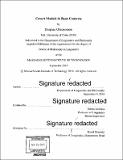Covert modals in root contexts
Author(s)
Oikonomou, Despina
DownloadFull printable version (15.00Mb)
Other Contributors
Massachusetts Institute of Technology. Department of Linguistics and Philosophy.
Advisor
Sabine Iatridou.
Terms of use
Metadata
Show full item recordAbstract
In this thesis, I examine two related constructions, Imperatives and Greek Root Subjunctives. I argue that Imperatives and Root Subjunctives should be studied in parallel, as this comparison reveals their individual properties better. The first puzzle that I address is the known ambiguity of these constructions between a possibility and a necessity reading. I provide evidence in favor of an existential analysis of these constructions and I argue that the necessity reading can be derived as an Implicature by exhaustifying over focus alternatives. This also allows us to better understand the prosodic differences between Imperatives and Root Subjunctives which convey permission on the one hand, and Imperatives and Root Subjunctives which convey command/request on the other hand. Furthermore, by treating Imperatives on a par with other Root constructions we can reformulate the question regarding the core characteristics of these constructions. We observe that both Imperatives and Root subjunctives have a covert bouletic modal operator with performative character. The fact that these constructions share these properties not only in Greek but also cross-linguistically is the second puzzle that we want to explain. I argue that we can account for these commonalities, if we analyse the Imperative as another subvariety of Subjunctive mood. Under this view, Imperatives and Root Subjunctives are treated as moodPs with a [+SUBJ] feature which will require the insertion of a modal operator with certain properties on top of the mood phrase. Further issues regarding the differences between the two constructions concerning their syntax and semantics are addressed showing that despite their similarities the two constructions should not be treated as identical. Finally, we discuss some deviating patterns which look like exceptions but in fact they provide further evidence for the present analysis.
Description
Thesis: Ph. D. in Linguistics, Massachusetts Institute of Technology, Department of Linguistics and Philosophy, 2016. Cataloged from PDF version of thesis. Includes bibliographical references (pages 223-235).
Date issued
2016Department
Massachusetts Institute of Technology. Department of Linguistics and PhilosophyPublisher
Massachusetts Institute of Technology
Keywords
Linguistics and Philosophy.